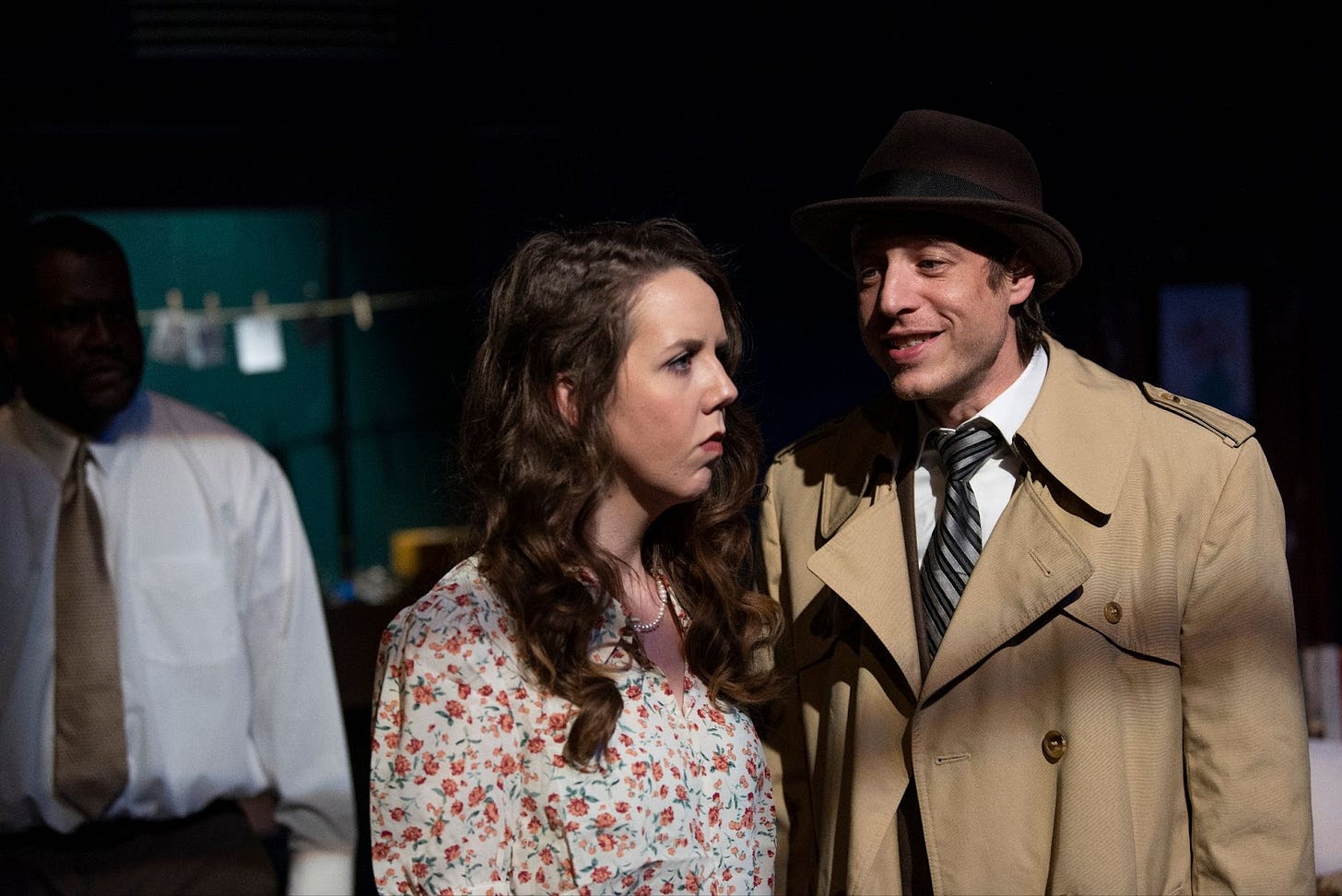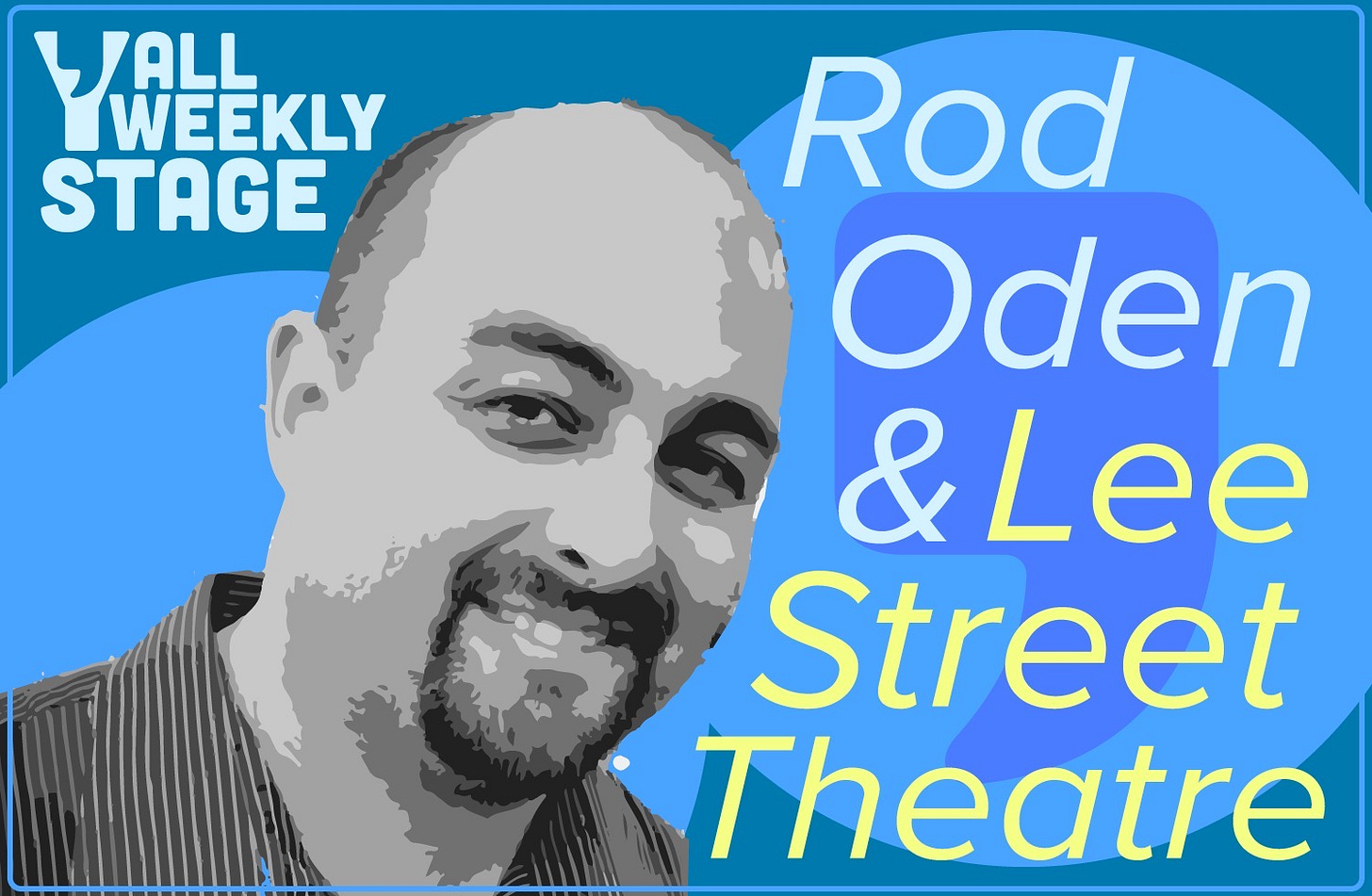Stage: Rod Oden & Lee Street Theatre
Salisbury, N.C. is staging some of the region's best theatre.
Between Lee Street Theatre’s current production of Lend Me A Tenor and its newly announced 16th season, there is a lot to look forward to in Salisbury.
This season, shows at Lee Street have been gripping, exultant, and hilarious. The performers and their production teams consistently leave everything on the stage, taking every opportunity to produce laughs and gasps in their audiences. Across many casts, audiences will find the same infectious energy at Lee Street, and executive artistic director Rod Oden is its wellspring.
Rod bounces onto the stage to deliver a curtain speech at the beginning of every show I’ve attended, and his enthusiasm and sincerity are clear. Oden does not stop after thanking the donors and assuring you there is a great show about to be performed. Like a magnetic carnival barker, he goes on to remind the audience of each remaining production in the season with unflagging excitement. By the end of his introduction, audience members are sure to have learned about at least one more show they will attend that year.

An expert lighting designer trained in technical theater, Oden has worked across the country. He founded the Southwest Entertainment Theatre Group in a strip mall in Santa Clarita, California, and launched the Big Rapids Shakespeare Festival in Michigan. After a stint as the technical director and production manager at the Jefferson Performing Arts Society in New Orleans, missing the passion he feels is inherent to community theater, Oden moved to Salisbury to assume the role of technical director at Lee Street. In 2019 he pivoted into the executive director position. With Oden at the helm for the last four years, Lee Street has seen steady growth, nearly doubling the giving and grant money they receive.
“What’s really great is the community of Salisbury – and I also mean the city, people who are in charge of the arts organizations, people who are in charge of the arts council, the various granting organizations – they’re really dedicated to the support of arts in our city, and also to the growth of our culture. The culture here is increased if we support our arts. They’re dedicated to it, and they work hard at it.”
Oden and I are grabbing a slice at the Salty Caper, a wood fired pizza joint half a mile down Lee Street. He looks over my shoulder. “As a matter of fact, directly behind us right now, that’s like the table of Downtown Salisbury. Actually, I’m going to totally be rude, I need to say hey.”
He gets up to greet colleagues across the room, exchanging a little banter. “That’s the thing about Salisbury,” he says, sitting back down. “I could be having pizza, talking with you about what we’re doing, and at another table is the executive director of Downtown Salisbury and their entire team, supporting businesses. They’re all about investing back into the community.”
Oden notes that he didn’t have much time in his leadership role before Lee Street had to shut down. When he saw the writing on the wall in March 2020, just days before Broadway canceled performances, he closed the doors. Yet through the pandemic, Lee Street showed a dogged commitment to continuing the work. “For the first time in a long time, we stopped. We said, ‘What are going to do?’ But like every artist I’ve ever worked with, we all said, ’I don’t know, but we’re gonna do it. We’re gonna figure it out.’ And we did. We produced through the entire pandemic with almost no money.”
Oden says that necessary changes in 2020 and 2021 actually contributed to the growth Lee Street has enjoyed. Once they launched their online streaming performances, they received support from surprising locales. They mounted a production of The Curious Incident of the Dog in the Nighttime. “We were broadcasting across the nation. We played to over 32 states. We played to six countries in the world. And then, out of nowhere, these donations would come from Minnesota, from California, from New York. Money was coming in because they saw our stream and they wanted to keep us alive. It was a horrible, magical time.”
Oden has spoken to me about his intention to produce Moliere’s 1763 script The Imaginary Invalid about an aging hypochondriac. He wants to set the comedy during COVID. With the careful humor of a good social studies teacher, Oden’s pitch for Invalid would leave anyone mystified as to what his political feelings about the pandemic actually are. He just wants folks to be able to laugh about it.
“I have always found, if I can laugh at something, I can stop and think about it easier. I can process solutions to it better. And I think people can take it easier. We are just now able to take that breath and say, okay, that was stupid. Those were some stupid times.” And when it comes to poking the bear a bit, “I want folks to come into my theater and say, ‘I grew from that show. I was thoroughly entertained.’ And maybe, ‘Let’s grab some coffee. I wanna talk about the part that didn’t make sense to me, or maybe I have an issue with, and start that dialogue.”
One way or another, theater naturally demands a little discomfort, and challenging an audience is the most sincere way to show them respect. Oden trusts the dramatic works themselves to urge folks into uncharted emotional and intellectual spaces. At Lee Street, entertainment is the priority. With a little joy, Oden quotes: “A spoonful of sugar helps the medicine go down.”
“But like every artist I’ve ever worked with, we all said, ’I don’t know, but we’re gonna do it. We’re gonna figure it out.’ And we did. We produced through the entire pandemic with almost no money.” - Rod Oden
When I ask him what Lee Street Theatre is missing, he says diversity and representation is a priority for him. As a person of Mexican and Jewish heritage, he is one of the only people of color leading a theater in the region.
“I think it’s important that we provide opportunities both in equity and equality on our stages. I’m really excited for our Legally Blonde, because we cast a person of color as our Elle.” Iris DeWitt, a veteran actor in the Charlotte scene, will play Elle Woods this July at Lee Street. “It’s not because we want to be a hot button topic theater. I’d like to tell Legally Blonde, as someone who comes from southern California, in a more accurate manner.” He points out that, in his life, he has come across many folks who would make an excellent Elle, yet do not look like Reese Witherspoon. “There is nothing about Elle Woods that is white. She’s just blonde.”
Oden aims to surprise audiences with stories they think cannot be surprising. “Next season, we are doing Agatha Christie’s Mousetrap. Before [we earned] our reputation for thriller, I would say ‘Agatha Christie’ and somebody would find a vomit bucket. ‘Really? Really? Are we all going to have tea and be shocked when the killer comes out?’ Nothing about that script is like that. But it’s what we’ve grown used to in community theater.”
Oden sees familiar fare like The Mousetrap as fertile ground for building a dedicated audience. “I think when audiences see us do The Cherry Orchard, or Chekov’s Three Sisters, or Ibsen’s The Dollhouse, we will do it Lee Street’s way. Even at a show you think you will fall asleep in, you will be engaged.”
Another missing piece for Lee Street, and theater in general, is youth interest. “The experience of coming to see theater is something lost on this generation. We really want young people to come in and realize this isn’t an Instagram post, we’re not watching an Avengers film. You can come be a part of this, whether you’re watching it, whether you’re in it, whether you’re an usher, a technician, a board member.” He says that getting younger folks to come out and see a show is an essential part of “putting the community back in community theater.”
In a small town, a flourishing theater community is not a given. It takes a small group of folks like Oden, artists, enthusiasts, and donors who see its value to keep it running when interest is slim. In Salisbury, it isn’t clout or fame or money that will move artists to deliver excellence. When we get down to brass tacks, an indefatigable belief in the power of theater must be present to power the drive of administrative and creative staff, not to mention each new cast and production team.
All by itself, a sincere mission like Oden’s has to inspire creators and actors to carry it out. Casts and crews need that inspiration to make good theater, and as Oden knows both instinctively and practically, it takes good theater to keep audiences coming back. “If you go to Charlotte theater and come see Lee Street Theatre, you’re going to see the same caliber of performers, the same production value.”
Venture a little further, Oden says. “Have a good time, get a good meal, and go see some really entertaining and engaging theater.”




Keep up the amazing work, Lee Street!!
Rod is such a wonderful person to know and work with! It is truly an honor to be able to take part in Lee Street’s passion and dedication to the arts.